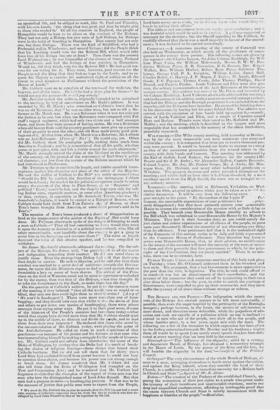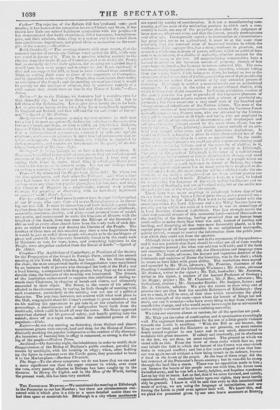THE Bmsnops axe THE Peoorm.—The indignation which time recent vote
of the Bishops has excited appears to be felt more universally, if possible, than even the anger inspired by time pertinacity of time Borough-
mongers; perhaps because, in time latter, the motive of self-interest is more direct, and therefore more defensible, while the prejudices of edu- cation and rank are capable of a palliation which no one is inclined to extend to men who are of the people, owe their an to time people, and whose families must, in a few years, again mix with the mass. The following are a few of the instances in which expression has been given to the feeling entertained towards Dr. Howley and his brethren ; to give them all would be to quote from nearly every speech thathas been deli- vered at every meeting that has been held in time country.
Birmingham—" The influence of the oligarchy, aided by a corrupt and degenerate Bench of Bishops, has obtained a momentary triumph in the House of Lords. By time power of time King. and the law, we will humble the oligarchy in the dust."—Manifedo of the Political Council.
Galzcay—" The very circumstance of the whole Bench of Bishops, al- most to a man, arranging themselves in battle array against the nation, and against the King himself, whom they consider the head of their Church, is a sufficient proof of an immediate necessity for a Reform both in Church and State."—aSimeech of Air. R. Adams. Eodem—" The conduct of the Prelates of the established Church, op- posing the restoration of their just rights to a people who groan under the tyranny of their inordinate and unprincipled exactions, merits our deep and unqualified condemnation, affording an irrefragable proof that the union between Church and State is utterly inconsistent with the happiness or liberties of the people."—.Resolution. 41:;I;ating d propriety of dispensing; with ea hen:die:Ay legislature son an'l r:Th::::ICe of the witole of the eropire. ;11, ,,.4%21,11c:•!--31,.. Pelee., SpereL. There hove been corny meetings in Edinburgh before that of last Core ( nem- Cork)—' I feel more, in sorrow than in anger for the conduct weee ; there has long been a Liberal party these, and a powered one : of the Bishops who gave their aid to the Rirougiunotemes in throw- but the meeting in the King's 1):mk is not to be confounded with the ing out this Bill. It must de themselves and their religion a great inks. tissemities which the Lord Advocate and a few 'Whig- lawyers have re- ry ; but from the time that these men laid aside their original attributes, peat:Illy got up within the walls of a tavern ; it was an assemblage of ....namely, meekness, charity, and piety,—and assumed those of wealth at lent foerteea thousand individuals. One fact strongly marks the and power, and endeavoured to unite the kingdom of Heaven with the sober and peaceful temper of this numerous band—several thousands on kingdom of the Earth, from that time the Bishops of the hierarchy of the outskirts of the meeting, having perceived that no human lungs this as well as every other church have been the ready tools of such des- could suffice to make them hear what was said, instead of jostling and pots as wished to cramp and destroy the liberties of the People. The bawling, and disturbing all that were more favourably placed, as is the conduct of these men on this occasion may show a wise Legislature that regular practice of all large assemblies in our enlightened metropolis, it would be just as well if those people who ouglit to be the harbingers of quietly retired, content to receive the information from the public jour- peace and good-will, but who were invariably found to be the ready tools mils which they could not from the speakers. of Ministers to vote for wars, taxes, and everything injurious to the Although there is nothing very new in the arguments of the speakers— People, were altogether excluded from the House of Lords."—Speech of and it was not possible that there should be—they are all of them worthy Dr. illilleit. of an attentive perusal ; for what was said was well said ; and if the facts Croydon—The Archbishop of Canterbury, as President of the Society and reasonings were of necessity old, the illustrations and language were for the Propagation of the Gospel in Foreign Parts, attended the annual not so. Mr. Brodie, advocate, the learned and ingenious detector of the ;tweeting at the Town Hall, Croydon, last week. 011 his Grace taking falsehoods and sophisms of Hume the historian, was in the chair ; which the chair, the most unequivocal marks of disapprobation were manifested he. seems to have filled with great ability. The resolutions were moved by an immense body of person* who thronged the-body of the Hall; and and seconded by Mr. Weir, advocate ; Mr. Prentice, chairman of the a loud hissing, accompanied with deep groans, being kept tip for a consi- Standing Committee of the Edinburgh Workmen ; Mr. Ayton, advocate derable time, the business of the meeting was interrupted. The friends Mr. Stodart, writer to the signet ; Mr. Tait, bookseller; Mr. Jameson, of the institution endeavoured to suppress this exhibition of feeling to- writer to the signet, a nephew of the learned Professor of Geology ; wards their Chairman, by clapping of hands and cheers, and ultimately Mr. Biggar, printer ; Mr. W. Chambers ; Mr. J. Hay, advocate ; Mr. succeeded in their dject. His Grace, in the course of his address, Sutherland, clothier ; Mr. Alexander Brodie; Mr. Sargent, hatter; and alluded to the circumstance, by saying, lie little thought of meeting with Mr. J. Christie, solicitor. We give the names to show what sort of such treatment, particularly as the meeting was not one of a political persons they are that lead the sensible Reformers of Edinburgh : they character. The populace, however, not content with what took place in are to a marl, it will be seen, of that class which constitutes the glory the Hall, congregated about his Grace's carriage in great numbers • and and the strength of the state—men whom the breath of Kings has not on his making his appearance to get into it, at the conclusion Of the made, nor can it unmake—who have every thing to fear from violent or proceedings, a simultaneous yell of indignation burst forth from the uncalled-for change, and who would never have sought for or advocated it multitude, which could be heard all over the town. His Grace appeared unless deeply convinced of its overwhelming necessity.
somewhat alarmed for his personal safety, and hastily getting into the We take our extracts almost at random, for all the speeches are good. vehicle, drove off at a rapid rate, amidst the continued groans of the
Mr: r: Weir put the value of combination and determination exceedingly well. His argument from precedent for the use of a little gentle violence Exeter—At our city meeting on Saturday, three distinct and almost ((With the Bill as our banner, the unanimous groans were uttered, loud and deep, for the Bishop of Exeter, towards the Lords is excellent. King at our head, and the Ministers as our generals, we must remain distinctly marking the popular indignation at the conduct of the diocesan. An intention of burning him in effigy is rumoured, so strong is the fed- firmly united together in one heart and in one mind, determined to ing of the people.—Western Times. maintain this great measure. If calmly and resolutely, yet in obedience Auckland.—On Saturday night, the inhabitants in order to testify their to the law, we act thus, we must succeed. The ground on which we disapproba stand tells us this. From the brow of these rocks which face us, you tion of the Bishop of Durham's public conduct, paraded the streets by torchlight, with his lordship in effigy ; when, after holding may behold the field in which the banner of the Crown was once struck down in































 Previous page
Previous page